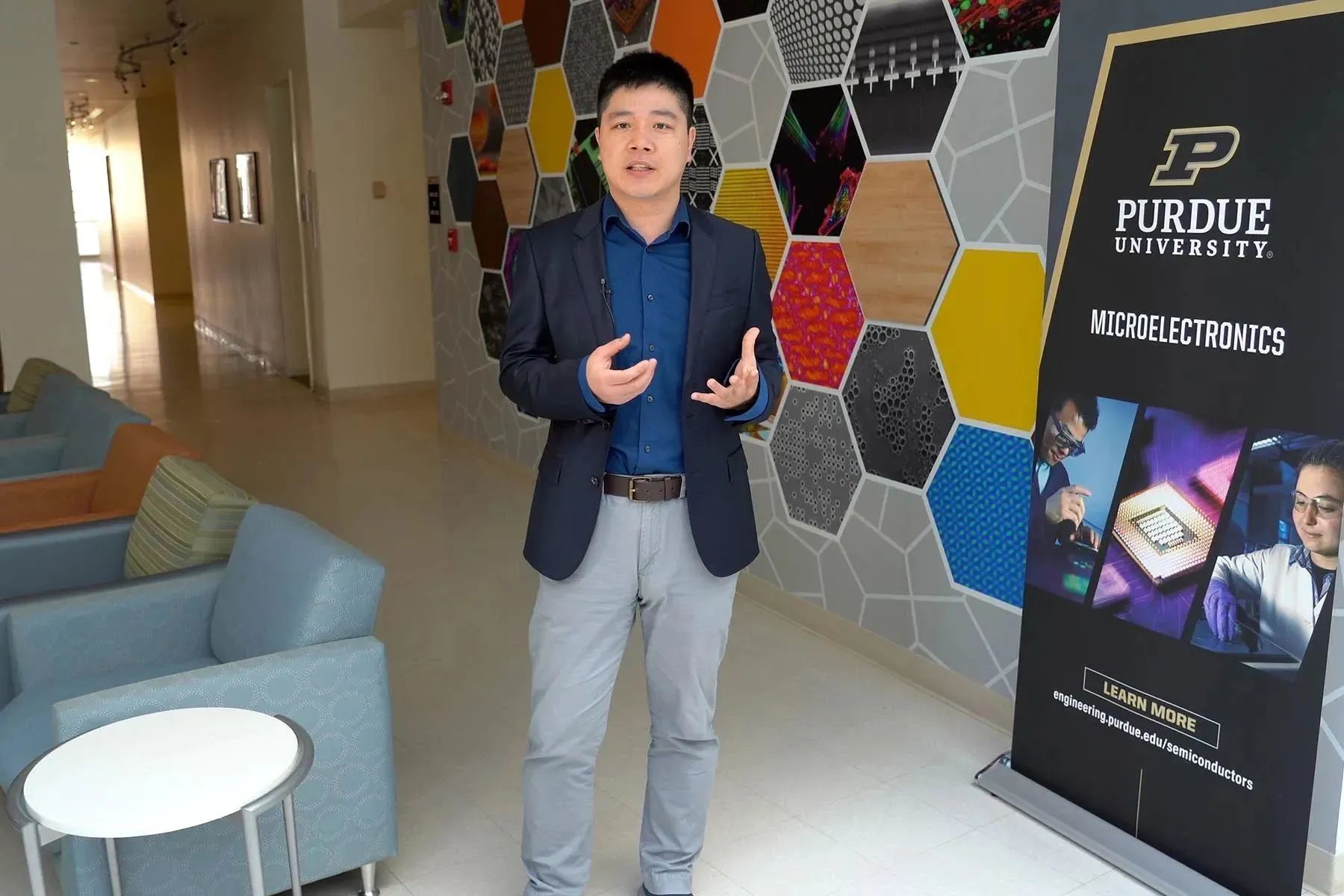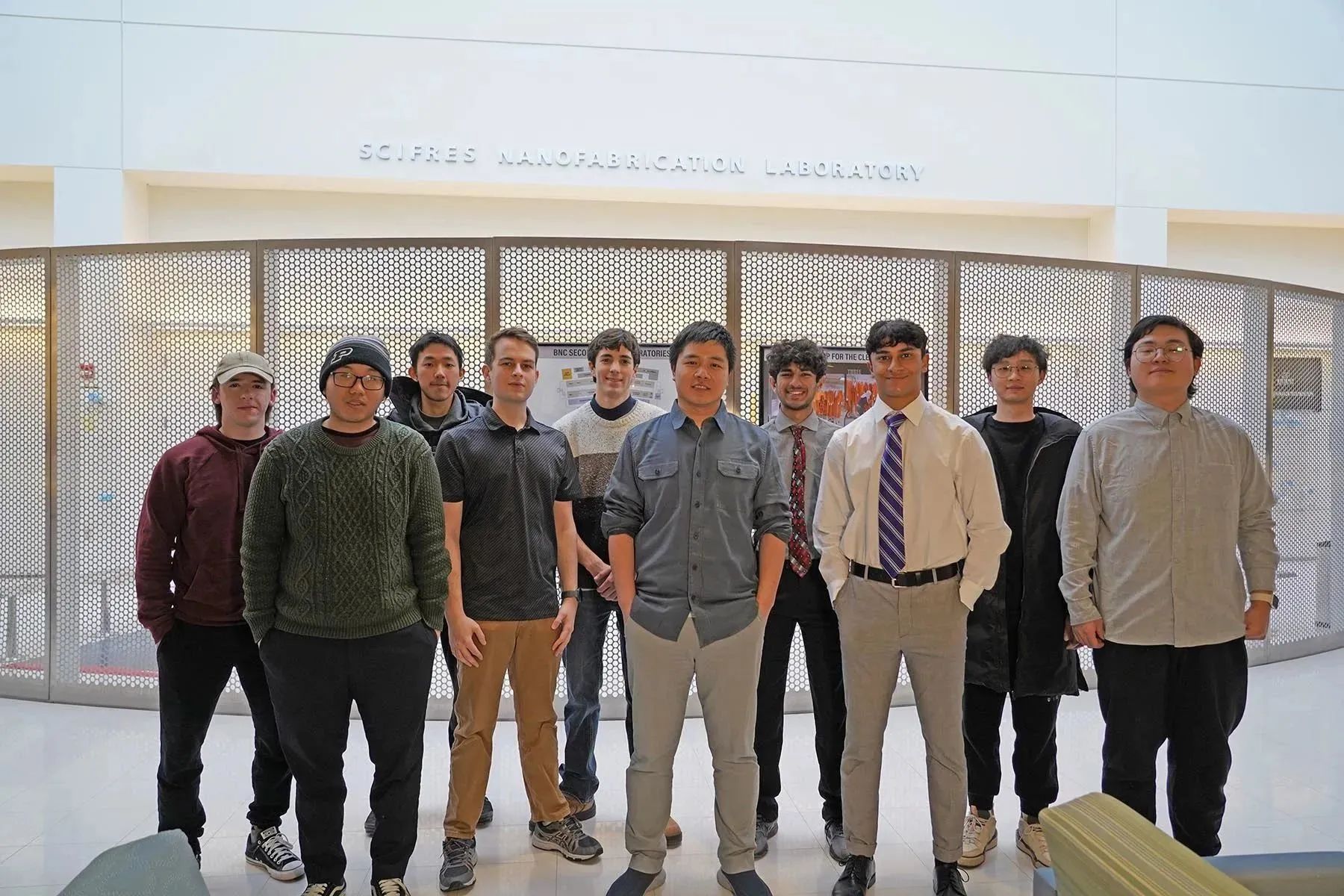一、Alpha Lab实验室介绍
实验室负责人魏体伟(https://alphalab-purdue.org),目前是美国普渡大学机械工程系助理教授,2020年至2022年在斯坦福大学机械工程系纳米传热研究组从事博士后研究。2020年博士毕业于欧洲微电子研究中心imec(全球著名微纳电子研发中心)和荷语鲁汶大学。Alpha Lab (All-in-one for Packaging, Heat transfer and Assembly Lab) 实验室的主要研究方向是芯片级三维系统集成,半导体互连和封装及芯片散热技术,欢迎感兴趣的同学与我联系!
实验室相关介绍文章(https://engineering.purdue.edu/ME/News/2023/from-micro-to-macro-cooling-data-centers-from-the-inside-out)
From micro to macro: cooling data centers from the inside out
In the U.S., data centers account for approximately 2% of total electricity consumption; a large percentage of that is for cooling high-performance microchips. Purdue University researchers have received a $1.9 million grant from the U.S. Department of Energy to develop cooling systems for these microchips, making data centers more efficient and saving energy that will help mitigate climate change.

Tiwei Wei researches solutions for cooling high-performance microchips, like those used in servers and data centers. His team has received a $1.9 million Department of Energy grant to help make data centers more energy efficient. (Purdue University photo/Jared Pike)
The grant comes from the Advanced Research Projects Agency-Energy (ARPA-E), as part of its Cooling Operations Optimized for Leaps in Energy, Reliability, and Carbon Hyperefficiency for Information Processing Systems (COOLERCHIPS) program.
“What’s unique about this project is the multiple scales,” said Tiwei Wei, assistant professor of mechanical engineering and the project’s lead principal investigator. “ We are focused on cooling not only at the level of semiconductor microchips and packaging, but also at the level of components, racks and systems, and even to the arrangement of the data center itself. All of these aspects are closely interconnected and work together to achieve efficient cooling.”
Wei’s ALPHA Lab focuses on semiconductor packaging, heat transfer and assembly. One of his areas of study involves two-phase jet impingement cooling, where microchannels filled with liquid are built directly within the microchip packaging itself. When the chip generates heat, the liquid boils and the resulting vapor carries the heat away. The vapor then condenses and is recirculated to start the cooling process anew. These cooling devices will be integrated, assembled and characterized in Wei’s advanced packaging lab at Birck Nanotechnology Center, home to one of the largest clean rooms in academia.
“This cooling method is ideal for high-performance semiconductors, like the ones found on servers in data centers,” Wei said, “but it also has great potential for cooling other high-power electronic devices and systems.”
Another innovative aspect of the proposal comes from Justin Weibel, associate professor of mechanical engineering and director of the Cooling Technologies Research Center. He will focus on topology optimization, a computer modeling technique that develops the most efficient arrangement of the microchannels for dissipating the most heat from the chip. That same technique will also be used at the macro level.
“It’s one thing to design a cooling device at the chip level,” Wei said. “But it’s important that these solutions also scale up, especially in a data center environment. The arrangement of the components needs to be optimized, as does the arrangement of the server racks themselves and even the software and user interfaces.”
Wei will collaborate with Bahgat Sammakia, Scott Schiffres, and Srikanth Rangarajan at Binghamton University to manufacture the fluid distribution manifold for the chip-level cooling device, as well as integrate the designs into functional components. They will also partner with SEGUENTE Inc., a global technology provider of high-performance liquid-cooled hardware platforms and software solutions. According to Ryan Enright, Chief Technology Officer at SEGUENTE Inc., “partnering with this strong academic team will further enhance SEGUENTE’s mission to address digital transformation demands. It is key that we build innovation pipelines to continue delivering products and services that enable customers to achieve sustainability goals and enhanced performance.”
“Improving the cooling efficiency of these microchips will have a huge impact,” Wei said. “If we can scale up our micro solution into a macro solution, then those energy savings will multiply by every data center in the world.”
The three-year $1.9 million grant, which starts in July 2023, is Wei’s first major research award since joining Purdue last year.
“As a new professor, it’s not always easy to be selected for these projects, especially as a lead P.I.,” Wei said. “But my mentor, professor Weibel, encouraged me to apply. The proposal took a long time to come together, but when they approved it, I was so excited! I’m thankful to ARPA-E for funding these cutting-edge projects.”
Purdue University has recently launched a comprehensive semiconductors and microelectronics program, demonstrating its persistent pursuit of leadership in microchip advancement through a series of innovative partnerships, programs and facilities.

Tiwei Wei is part of a large interdisciplinary team at Purdue University focused on semiconductors and microelectronics. (Purdue University photo/Jared Pike)
Writer: Jared Pike, jaredpike@purdue.edu, 765-496-0374
Source: Tiwei Wei, tiwei@purdue.edu
二、研究背景及方向
随着电子产品对器件小型化,多功能系统集成,快速通信等需求不断的增加,微电子三维集成封装技术变得越来越有前景。三维集成主要是通过在垂直方向上堆叠多层芯片来提高芯片的集成度,从而降低金属互连线长度和互连延迟,进而成为推动半导体工艺技术向“延续摩尔定律”和“超越摩尔定律”发展的主要动力。然而,不断缩小的互连尺寸使芯片集成工艺及可靠性变得越来越具有挑战性。另一方面,高密度三维集成系统会导致芯片热通量和功率密度大幅度增加,从而需要高性能、低成本和节能的热管理解决方案来应对这一热挑战。
根据以上应用背景,Alpha Lab的研究重点主要有以下几个方向:
1.三维系统集成 (3D system integration), 包括新型三维集成堆叠技术,高密度互连技术;
2.芯片高性能冷却技术(Advanced thermal cooling),芯片级嵌入式微型沟道冷却和冲击射流冷却技术;
3.高性能散热材料开发与表征,包括高热导率热界面材料 (thermal interface materials), 高热导率底部填充材料(high thermal conductivity underfill)
三、学生培养
实验室处于建设初期, 需要我们一起共同努力,我会从最基础的软件使用,仪器使用及安全操作,科研写作、文献检索等进行培养。希望你有一定的数理基础和科研软件的使用经验。
研究组与美国斯坦福大学、佐治亚理工学院、欧洲微电子研究中心imec(全球著名微纳电子研发中心)、荷语鲁汶大学等有着密切的合作关系。具体培养方案参照普渡大学机械工程学院官方网站。
四、招生要求
1: 欢迎有机械工程,半导体物理,电子工程,封装材料科学工程或其他相关背景的学生加入课题组;
2: 优异的本科学业成绩,熟悉半导体器件及半导体工艺和封装,数值模拟,传热传质,流体力学及热力学等课程;
3: 优异的托福/雅思和GRE 成绩,良好的英文写作,阅读及沟通能力;
4: 希望你积极上进,对科研有浓厚的兴趣,有很好的团队协作及学习能力。
五、申请方式
来信请注明邮件标题:2024年博士申请+姓名+专业
请将您的个人简历、成绩单和个人陈述(1页),科研经历综述(1-2页),发表的论文发送至Alpha Lab 负责人魏体伟邮箱tiwei@purdue.edu

